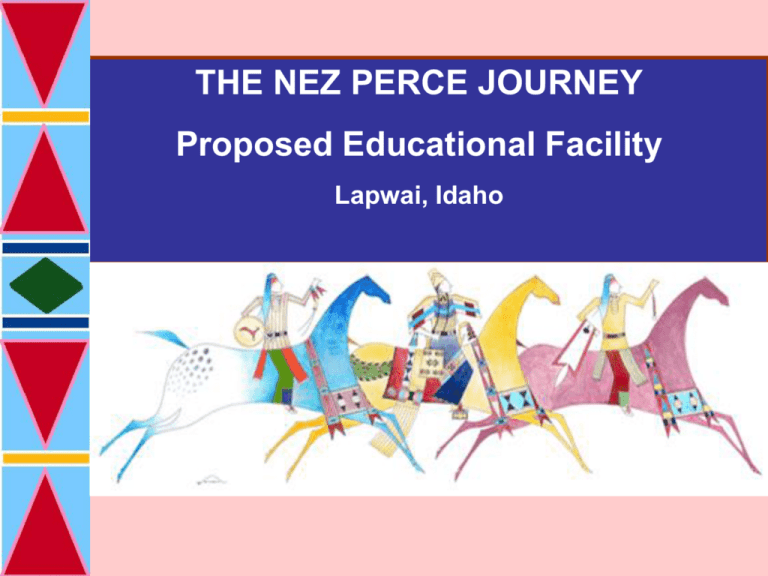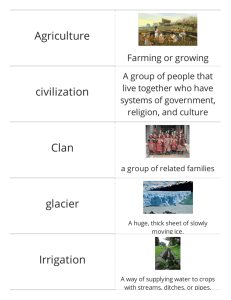Presentation for new Education Facility
advertisement

THE NEZ PERCE JOURNEY Proposed Educational Facility Lapwai, Idaho Purpose of Today’s Presentation To: Share the Nez Perce Tribe’s vision for the future Introduce the concept of a lifelong journey in education Introduce the proposed new education center in Lapwai, Idaho Explore the possibilities of the new facility Explore community educational needs The Nez Perce Education Dept. 1998 The Space Crunch: Even with the creation of a formal Tribal Education Department in 1998, programs could only be offered space in available structures. Space needs were on a first come, first served basis. Some programs were housed in turn of the (twentieth) century buildings, others in surplus government trailers. The Nez Perce Education Dept. 2007 Little has changed in nearly ten years. The youngest of the Nez Perce children are housed in the basement of a eighty-five year old tuberculosis sanitarium dormitory that can not meet Federal space and ADA access requirements. Student and adult programs use classrooms as office space and kitchens as conference rooms and classrooms. Privacy issues are common. Offices originally designed for one now house two or three. The Nez Perce Education Dept. 2007 Privacy is preserved by using janitorial closets as office space. Head Start classes are held in a building that requires radon mitigation and mold/mildew treatment. Several programs of adult higher education must conduct classes simultaneously. The yearly cost of facility maintenance competes with educational programming budgets. • The Future of the Nez Perce Education Department Our vision for the remainder the 21st Century is to build a state of the art facility, with the latest in technology, to serve all those interested in furthering their education and/or enhancing their employability. It will be a “one-stop” educational center that will offer an array of programs benefiting the youngest child as well as the seniors of the tristate area. Emphasis will be on Tribal education but all will be welcome. The Vision Defined The project will construct a multi-program facility that will include workforce training, education and a business incubator. The facility will provide approximately 35,000 square feet of space to integrate several existing programs and add new training programs. It will house educational components from children’s Head Start to adult education and provide a single-point-of-service delivery, for the tri-state area, at the Nez Perce Tribal center in Lapwai, Idaho. The Vision Defined The environment created by the new facility, and the education and workforce training that will take place in the facility, will build towards the community’s quality of life through the development of economic opportunities. The end result of the proposed project will mean life-changing opportunities for those who participate. The Vision Financed Economic Development Administration: The Nez Perce Tribe has been invited to submit a final grant application to the EDA. The preliminary application was submitted at the beginning of the funding year in October of 2007. United States Dept of Agriculture: Once EDA funding has been secured, a grant request will be tendered to the USDA for the cost of infrastructure costs. The Vision Financed Matching Tribal Funds: The NPTEC governing body has expressed strong support on all levels for the project and will commit funds as needed. In-kind Tribal Contributions: The Nez Perce Tribe has contributed a highly visible piece of property in the Town of Lapwai as the site of the new facility. Programs: Existing programs will be sustained on funds currently provided by the Nez Perce Tribe or the program’s “parent” agency. The People EXECUTIVE DIRECTOR EDUCATION MANAGER PRE-HEAD START AND HEAD START ADULT AND HIGHER EDUCATION TRIBAL EMPLOYMENT RIGHTS VOCATIONAL REHABILITATION STUDENTS FOR SUCCESS The Education Manager The Education Manager will play an absolutely essential part in the success of the new education center. In concept, the Manager’s office will be responsible for The day-to-day operation of the project facility. Coordination of plant maintenance, staffing assignments. staffing and Coordinate, with the program managers, to develop curricula in support of the program goals. Point of Contact for on-going EDA reporting. Seek out and engage instructors for long and/or short term specialized course instruction. The Education Manager Act as liaison between the project and other educational entities within the region and the nation. Establish a working relationship with these educational entities and coordinate partnerships with each. Be an active, aggressive and enthusiastic “salesman” for the project and the overall education program. Act as the program’s most visible proponent. As such, speak to local, state and national groups, including legislative groups and individuals in an effort to gain support for the concept. The Education Manager Organize and coordinate grant writing in support of the overall project as needed. Act as liaison between of the Board of Directors and staff (and others as needed). Act as liaison and report to NPTEC on overall educational matters in general, and program goals, in particular. Provide, for project participants, administrative support such as guidance counseling, financial aid and assistance, review eligibility requirements, liaison between participants and off-reservation colleges and universities, referrals, etc. The Possibilities Website Design and Maintenance: A quickly expanding and future-oriented field. The Study of Viticulture: Training in cooperage, stainless steel equipment maintenance, inventory tracking, aging and blending for the wine industry. Commercial Kitchen: To provide a training venue for cooks, serving staff, food handling requirements, commercial cleaning agent compliance and food service business practices. Plant Maintenance Techniques and Methods: The correct handling, use and disposal of the various cleaning products, equipment maintenance and basic bookkeeping. The Possibilities Budgeting and Bookkeeping: Training in businessoriented computer software with emphasis on support of the family business. Short Business Courses: Orientation in state sales tax accounting, bank loan applications, inventory control and simple AP/AR principles and record keeping. Child Development and Care: Training in home-based daycare. Classes that include state and/or local licensing requirements, CPR, nutrition and first aid. Adult Care: In-the-home care to provide classes in nutrition, first aid and orientation on problems of the ageing. The Possibilities Advanced/Refresher Professional Courses: Law enforcement, firefighting, EMT or any profession that requires long distance travel for certification and recertification classes. Business-Sponsored Skills Training: CNC machine operation, aluminum welding techniques, small engine repair, office equipment repair. Standard Business Practices: Seminars in workplace ethics, interpersonal communication, customer service, time management, team building, productivity and other professional development practices. The Possibilities Heavy Equipment Operators: Seasonal or year around, trained professionals are always in demand. Media and Entertainment: Training in computer programming and graphics, lighting, sound mixing, theatre design and other equipment operation. Basic Marketing Techniques: Topics such as marketing communication, product development, business writing, effective advertising, sales, planning and other principles of entrepreneurship. The Possibilities Medical Record Keeping: Classes in medical terminology and spelling, keyboarding, insurance programs among others. Remedial Math and English: Employability and the success of higher education can often depend on skills that were not assimilated in the regular school classroom. The possibilities are limited only by the demand. Our Goals Effectively maximize Tribal dollars so that quality education and workforce training are delivered. Provide a vocational training facility that will allow educational flexibility to those with job and family obligations. Allow a cohesive integration of programs so that they can more easily coordinate students from one program to the next or multiple programs at the same time. Provide the background and knowledge needed for Tribal members to start and maintain their own businesses while providing additional jobs and stable incomes for their employees. Our Goals Provide training needed for Tribal members to successfully fill positions within Tribal programs and departments thus allowing them to remain within the Reservation community. Provide a venue for the Tribal Employment Rights Office to pursue its goal of equal and fair employment for Tribal members. Provide a pool of trained individuals to which local businesses can apply for skilled employees. Provide a place where businesses can actually train students to fill specific needs and positions. Provide incentive for corporations looking to move into the region and in need of trained personnel. Our Goals Provide a base for learning of all types, for all ages. Provide a new foundation on which the Nez Perce Tribe’s young people can build a strong interest for all aspects of the Nez Perce culture. Provide the training and education needed for Tribal members to work for a living wage and contribute to the welfare of their families and their communities. Provide a positive psychological statement to all students, current, future, Tribal or non-tribal and to local private and public entities that the Nez Perce Tribe is committed to education and training for everyone.






